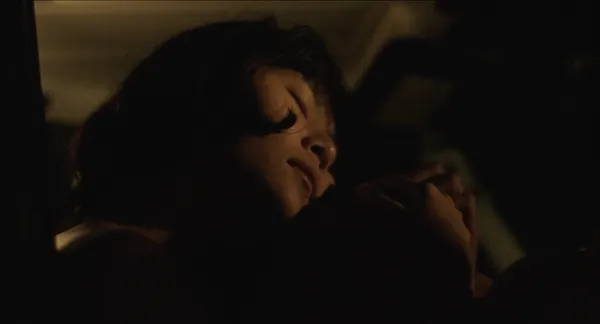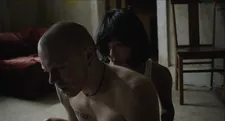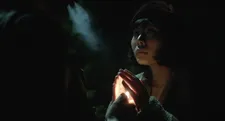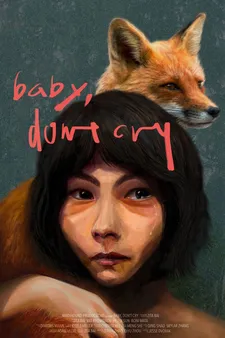 |
| Baby, Don't Cry |
Baby (Zita Bai) is a Chinese immigrant with a troubled home life, living on the outskirts of Seattle. Fox (Vas Provatakis) is a young delinquent who steals from her only to be charmed by her fighting spirit. Their passionate affair turns everything upside down. Screening as part of 2021’s Fantasia International Film Festival, Baby, Don’t Cry! is a small but impactful film which presents an outsider’s view of US culture and charts a young woman’s sexual and spiritual journey into adulthood.
Zita, who wrote the film herself – it was directed by Jesse Dvorak – agreed to meet shortly before the festival to talk about the film. Her co-star Vas and producer Qiyu Zhou joined us, and I began by asking Zita about the roots of the story.
“I think that goes back to a lot of how I was growing up in America as an immigrant,” says Zita. “I always say this to all my friends, you know, in horror films or fantasy the supernatural elements are coming from how we feel deep inside. So I felt like it was very important to tell the story from Baby's perspective, like as a young immigrant, how she navigates in her own realm.”
 |
| Vas Provatakis and Zita Bai in Baby, Don't Cry |
It’s a film which hinges very much on the characters themselves. Rather than starting with the narrative, did she begin by developing the characters and seeing how they would interact?
“For sure. And also, speaking of Baby and Fox’s relationship, I think Vas here really helped me to find that balance between Baby and Fox.”
“Yeah, we had some time as well beforehand to rehearse,” says Vas. “And, you know, Jesse was there for that. So it would be us just in a room. It was interesting, it wasn't just us doing scenes. It was just kind of like feeling each other out, like improvising, Jesse had us do these interesting exercises. One of them was like, Zita had to get on my back, and we had to run up and down the hallway, you know, at the college and people were there, they were like, ‘What the fuck are these people doing?’ So there's things like that just like these kind of bonding moments. And what it created was this really interesting sort of symbiotic relationship between us where it's like, we were in each other's heads, and we could improvise and do weird things together and feel fully accepted.”
Where did he start with developing a character who is sometimes quite mean, and keep the audience, as well as Baby, caring about him?
“You know, he's a very personal character for me, I grew up moving around the East Coast. When I was a kid I lived in maybe ten or eleven different houses growing up until I moved to California, and you know, in these little towns that I lived in, I knew kids who were very rough, like Fox is, and they weren't exposed to much of what the world had to offer. So they were a certain way because of it, and I got to see sort of what that life is like, and there was a hypothetical question in my head. If I had stayed in a small town, and if I had never moved around, if I didn't meet people, I didn't have exposure to different ideas or different cultures, or different races of people for that matter, who would I be?
“I’m not saying everyone like that is bad, but it was kind of just the big hypothetical question. And I think Fox challenged Baby in ways because I feel like his aggression and his, you know, his meanness, kind of made her learn how to stand her own ground more and keep persisting from a feeling of love, which in turn, made him.”
We talk about the animalistic behaviours that people often exhibit when they’ve been excluded from society or haven’t finished growing up, and I ask about the animal motifs in the film.
 |
| Baby looks for warmth |
“Actually, the animalism in the story comes from Chinese mythology,” says Zita. She explains that there’s a Chinese term which translates as “someone who wakes you up sexually and rocks you in bed,” and explains that in this story “we wanted to tell about teenage sexuality through like, a female lens. So we reverse the gender stereotypes, and Fox serves as this fiery energy for her. It also helps her to discover herself sexually and also, you know, presses her to become a more mature person.
“Sometimes I think that, you know, everything happens for a reason a season or a lifetime. So Fox serves in Baby's life as a vehicle to help her to get to the next spot.” The focus, she stresses, remains on Baby learning how to be herself.
There's also an important relationship in the film between Baby and her mother, and it struck me that we don't see that kind of relationship very often in films, where there's the kind of damage that there is between those two characters. Where did Zita start with telling that part of the story?
“That also comes down to how I felt when I was younger, and, you know, I think this is true to everyone, like, what's real is different than what feels real. And especially in Baby's head. She's so tender, she’s at that age, she’s trying to cope with new environments and also make sense of everything. So a lot of times she fabricates truth in her head and turns it into something strong, like, for her.”
Qiyu nods and chooses this moment to interject. “I want to say that Mother is a metaphor as well, just as the same as Fox. More like what Baby sees as a teenager. As you can see like there are the piggy ears around mother's head sometimes, but sometimes there are not, because it's more like we're trying to emphasise that this is Baby's perspective, seeing the mother, that sometimes she could be a little bit harsher than than the mother should be. But it's just in her head while she’s growing up.”
I ask Qiyu how she got involved with the project and what interested her in it as a producer,
“It started with a script,” she says. “Zita brought me a very well written script. And she has been working on it for several years. And originally, she was asking me for notes. I started directing in the American Film Institute and at the beginning I served as a note giver and a fellow writer, just trying to craft a valid script with her. Eventually I found that it's a story that speaks for me as well, because it's just the same kind of darkness. And also the being a person who doesn't really speak the language that well, back then, and also how isolated, without being on a physical Island, but like, we see a lot of people but we’re still so so alone, sometimes. I was feeling that and I just felt like this was something we should do together.”
 |
| Baby, Don't Cry poster Photo: courtesy of Fantasia International Film Festival |
Did she feel that it would be challenging to get it made, given that we don't get many stories like this, certainly in mainstream cinema in America?
“I think that's a challenge,” she says. “But also it's something that we're still excited about. Because it's so under represented, I've seen so many movies with Asian characters, but I’ve never see anybody like baby and a relationship like Baby and Fox. It’s very unique to me that they're dark, because we, as a human, we have the brighter side and we also have the darker side and the deeper side. And [in the context of] immigration, I feel like It takes a lot of courage to tell a person like this. Because usually, like Zita mentioned before, like, we don't want to make a movie with an Asian girl who's also a perfect model. Both of those, yeah, we're seeing so many times, but this one is different.”
Baby uses a camera through much of the film, capturing odd, distinctive images in a way that means we’re seeing the world directly from her perspective. When I ask about this, Zita says that it’s something she discussed a lot with Jesse, and that she’s grateful for the trust he gave her.
“ I think what was important to this is Baby's perspective. And because when I first moved to the United States, I didn't speak English. I couldn't vocalise what I was experiencing, but I could document through camera, what I was seeing what I was experiencing.”
This presents us with an outsider’s view of US culture which looks different from the way the country likes to portray itself. Fox ends up representing a certain aspect of America, I suggest.
“Yeah, I definitely agree,” says Vas. “I think that what it comes down to is, you know, when you're not exposed to different ideas, or different people or different cultures, you only know as much as you know, so if you meet people that are from different places, then automatically your idea of the world is going to be challenged. And it's up to the person if they want to expand their knowledge and what they feel about people, or stay the same. But obviously, it's better to grow. It's better to learn from people. I think that we live in a really great time where people who were not able to tell their stories in the United States, especially, are finally able to, and we're getting some really damn good stories out of it like this one. So it was just my pleasure to be able to work with them on it.”
Did Zita originally expect to be starring in it herself?
“When I first presented this story, I definitely had the idea of casting someone else to play Baby,” she says. “Because, you know, Baby’s not necessarily like model minority. And I was afraid, you know, people wouldn't be able to give themselves 100% to this character. And I think it's very important to show different types of Asian characters in American cinema. But I just felt like if I portray this character, I'm going to do it honestly. I guess I didn't want to put other actors in that kind of position.”
She’s thrilled that the film made it to Fantasia.
“ I think that's such a trip. Honestly, we didn't expect our film would end up at like my dream festival. Fantasia has always been a festival that I dreamed about attending so this is a huge honour, I think in the end it’s just like, finding the people who share the same passion, like same dreams.
“So me and Qiyu are working on two other genre films and we plan on filming those in the next two years. So we're very excited. This time, she's got to be the director. I'll be the actress in it.”
Vas has just wrapped on a film called Hollywood Hopeful after a two month shoot, describing it as “one of the craziest experiences I've ever had,” and is doing some directing and music. “Wherever the inspiration goes, just go,” he says.
Baby, Don’t Cry will screen at Fantasia on Wednesday 11 August.





















